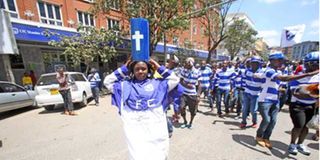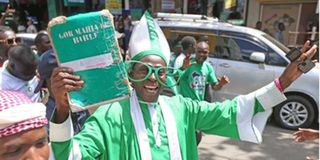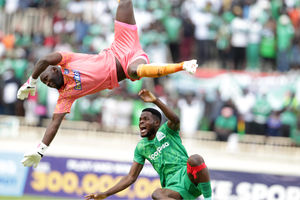
Bishop Fred Akama presides over a a church service at Tent of Testimonies Ministries International in Nairobi. He is the chairman of board of trustees of Kenya Police FC and Kenya Police Bullets .
In March 2021, photos of Gor Mahia officials and coach Carlos Manuel Vaz Pinto at the shrine of Gor K’Ogalo in Kanyamwa, Ndhiwa in Homabay County caused a stir in local football circles.
Gor K’Ogalo is a legendary medicineman whom the club was named after in 1968. The club’s visit to Kanyamwa was seen as an act of paying homage to the man it is named after, and to seek blessings for their new coach Vaz Pinto who was embarking on a journey with the club.
Two years earlier, Gor had taken Turkish coach Hassan Oktay to Kanyamwa to pay homage to Gor K’Ogalo, inviting claims of the use of witchcraft in football.
Such claims have been made against AFC Leopards, Shabana FC, and against a host of coaches in the Football Kenya Federation Premier League (FKF).
Claims of teams using witchcraft or black magic to win matches are common in African football.
In 2010, media reports indicated that the South African Football Association had enlisted the help of ‘sangoma’, a traditional healer who practices ‘ngoma’ (holistic healing philosophy) to help the country’s national football team Bafana Bafana to win its final Group ‘A’ match at the 2010 Fifa World Cup which the country hosted.
South Africa won 2-1 but crashed out of their home tournament.

Fans of AFC Leopards march on the streets of Nairobi before a league match in 2023.
In a rare interview, Bishop Dr Fred Akama, a cleric who is also chairman of the Board of Trustees of Football Kenya Federation Premier League team Kenya Police FC, and FKF Women Premier League team Kenya Police Bullets, has disclosed that he has witnessed the use of witchcraft by ‘research departments of teams’ to win matches.
“On match day last season, a prominent local team I won’t name tried to perform rituals before our game. They attempted to bring a coffin into Police Sacco Stadium in South ‘C’ in Nairobi at midnight. It was unclear whether it contained a body, but stadium security officers stopped them,” he said.
“Later they came with their ‘priests’ and sprinkled some water around the stadium, usually meant for the dead. I had not planned to attend a match that day, but I received a phone call from our club’s executive chairman (Munga Nyale) to go to the stadium immediately and hold prayers since there was growing tension. During pre-match warm-up sessions, our opponents placed cones and balls on the pitch, and entered the pitch with their ‘priests’ and sprinkled water on all goalposts, match balls, and cones. In contrast, we prayed to God, and he did magic for us,” he said.
“During the match, one of the officials kept saying that their magic was not working. We had scored a goal and we were leading. One of their officials was complaining after we defeated them by three goals. They were saying ‘today science is not working for us’,” Akama, who holds a PhD in Divinity from United Graduate Seminary and College in the USA, added.

Fans of Gor Mahia march on the streets of Nairobi before a league match in 2023.
A spot-check by Nation Sport shows that Gor Mahia lost 3-1 to Kenya Police in a league match played at Kenya Police Sacco Stadium on February 3, 2024.
Akama says some local clubs believe in juju because it has proved deceptively effective in the past.
“The clubs invest heavily in these practices, meaning that they must have seen something. Remember (former Manchester United midfielder) Paul Pogba accusing his brother of holding similar beliefs? And then Kylian Mbappe came into the picture? These beliefs go beyond Kenya,” Akama says.
Kenya Police FC currently lead the FKF-PL table of standings with 37 points, the same as Tusker FC who have an inferior goal difference after 19 matches.
The 21-time Kenyan champions Gor Mahia are third on 31 points, with a game in hand. Kenya Police Bullets lead the Kenya Federation Women Premier League (FKF-WPL) standings with 25 points from 12 matches, the same as Kibera Soccer Women who have an inferior goal difference.
Akama, who also chairs APS Bomet in the second-tier National Super League (NSL), said: “We have made a good name for ourselves. Kenya Police teams currently lead the local leagues, and we feel no strategy other than hard work will dislodge our teams from the top positions. With God, everything is possible.”
He leads Tent of Testimonies Ministries International and has authored several religious books.
On September 24 last year, AFC Leopards goalkeeper Levis Opiyo caused a stir when he blamed his poor performance in his team’s 1-0 loss to rivals Gor Mahia in a league match at Nyayo National Stadium on ‘juju’ (black magic). Opiyo said his body felt unusually weak in matches involving his team and Gor Mahia.
“There is a guy at Gor Mahia that I have noticed over time, and I am ready for him now. I won’t tell you exactly what he does, but our stewards have seen him, and God has shown me his actions. When I was at Gor Mahia, he was a good friend, but I felt he was using black magic on me. I feel weak during the big games, particularly these (‘Mashemeji’) derbies,” Opiyo, who has previously played at Wazito FC (now Muhoroni Youth) and Gor Mahia, said.
In Tanzania, there have been claims of the use of witchcraft to influence the outcome of matches in the Kariokor derby between Yanga Sports Club and Simba Football Club.
“In Tanzania, the use of black magic in football is real. Whenever we travelled for away matches, witch doctors were always part of the budget, and we travelled with them in the same bus. Before every game, they would apply oil on players’ chests. At one time I fell sick and I couldn’t get out of bed. I missed training for about a month, then I returned to Kenya for treatment but things didn’t work. Even prayers were not working. A strange object shaped like a starfish was removed from my body in Tanzania, and I returned to playing football,” Dennis Wanyoike, who played for Fountain Gate Academy in Tanzanian Premier League, said.
Wanyoike previously played for Kenya Police FC and KCB in the Kenyan Premier League.
“My Tanzanian club once hired an Egyptian coach but soon fired him for refusing to engage in these practices. The club confiscates passports of players who don’t comply with demands,” Wanyoike says.
“At the height of the Covid-19 pandemic, I left Kenya to seek greener pastures in Tanzania, but things took a different twist when I joined the club. The players were given a powdery substance to sprinkle at the opponent’s goal every match day. It was a strange practice, and I couldn’t take it anymore so I left after a month in 2021,” a Kenyan female footballer who requested anonymity said.
“We went through strange things. On the eve of a match, we were made to jump half-naked over fire. We could sometimes cover ourselves with blankets under smoke for about 10 minutes. Fortunately, we won all our matches, but life became too difficult, so I left for home,” she added.
Why do some Kenyan teams believe in the “use of research” as the practice is commonly known, to win matches?
Dr Joyce Nyairo, cultural analyst and author of ‘Kenya @ 50: Trends, Identities and the Politics of Belonging’, says football clubs often seek divine intervention to provide them with strength and faith in their endeavours.
“It is about belief, and using it is fine just so long as it doesn’t harm others. Some may as well use it to intimidate opponents; so long as no harm is done, that’s acceptable. Faith and spirituality are sensitive things,” she says.
Nyairo says such rituals as making the sign of the cross after a victory, or the ‘Haka’ chant by the New Zealand men’s rugby team are expressions of determination to fight and be on top of the opponent.
“We perpetuate colonial attitudes toward African spirituality. Would we accuse a player wearing a rosary of practicing juju? The rosary serves the same purpose as an amulet, cowrie shells, or Muslim prayer beads, all bolstering a player’s courage and confidence.”
Silas Kirinya, a psychologist and counselor, says that many players use juju due to the fear of losing, or a feeling of desperation during an important competition.
He says that in these situations, some players resort to the use of juju, which they believe provides them with a psychological sense of protection, but this belief is not proven.
“This is seeking external assistance, effectively expressing a lack of self-belief and reliance on something or someone else. This reliance on juju suggests that these players are looking for help from forces they believe to be beyond the natural realm,” he noted.
Kirinya says many people go for therapy due to anxieties, insecurities, and overwhelming pressures they face in competitive environments.






